EU Dismisses Iran’s Sanctions As ‘Purely Politically Motivated’
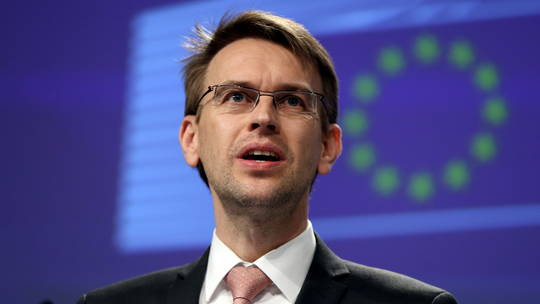
The European Union on Thursday dismissed sanctions that the Islamic Republic imposed on several EU individuals and media outlets in a tit-for-tat move as "purely politically motivated."

The European Union on Thursday dismissed sanctions that the Islamic Republic imposed on several EU individuals and media outlets in a tit-for-tat move as "purely politically motivated."
Expressing concerns about the clerical regime's ongoing violent crackdown on antigovernment protests, EU’s lead spokesperson for foreign affairs Peter Stano told journalists Thursday that contrary to Tehran’s sanctions, “when you take the EU sanctions (on Iran), they are adopted on clear legal grounds, based on the evidence of human rights violations in Iran."
In reaction to the EU’s October 17 sanctions targeting Iranian individuals and entities over their role in the brutal suppression of peaceful protests,Tehran announced Wednesday sanctions against eight institutions and 12 individuals based in the EU.
Iran’s Foreign Ministry claimed that the Islamic Republic’s sanctions were imposed due to “deliberate actions in support of terrorism and terrorist groups, encouraging and inciting terrorism, violence, and hatred, which has caused riots, violence, terrorist acts, and human rights violations against the people of Iran.”
Iranian authorities, including the Supreme leader and the president, accuse Western countries and Israel of being behind the current wave of antigovernment protests, ignited by the death in custody of 22-year-old Mahsa Amini.
The new list of sanctions includes the Persian-language services of Germany’s Deutsche Welle and France’s RFI, extending Iran’s animosity against foreign-based channels that it says are promoting an uprising such as BBC Persian and Iran International. Two directors of the German newspaper Bild were also blacklisted.
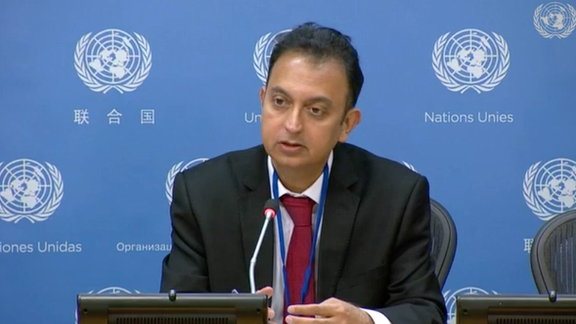
The UN Special Rapporteur on the Human Rights Situation in Iran has called for prompt establishment of investigative mechanism into human rights violations in Iran.
In a statement on Wednesday, Javaid Rehman said current investigations and domestic accountability channels had failed to meet the minimum standards of transparency, objectivity and impartiality, urgingan independent mechanism into all human rights violations leading up to and since the death of Jina Mahsa Amini, who died in hospital after being arrested by the morality police.
He said that the Islamic Republic is monitoring, harassing, and sometimes beating women on a daily basis in the pretext of its mandatory dress code -- implemented through the morality police.“This is meant to instill an atmosphere of fear,” he noted.
“Chronic impunity and lack of redress for previous violations have culminated in today’s events as we see protests throughout the country calling for justice and accountability for Amini’s death but also demanding respect for fundamental socio-economic and political rights and particularly freedom of expression,” he added.
Also on Wednesday, a group of UN human rights experts condemned the killings and the crackdown by security forces in Iran on protesters, including alleged arbitrary arrests and detentions, gender-based and sexual violence, excessive use of force, torture, and enforced disappearances.
They also urged that the reports be thoroughly and independently investigated and those responsible held to account, adding, “An alarming number of protesters have already been detained and killed, many of whom are children, women and older persons. The Government must instruct police to immediately cease any use of excessive and lethal force and exercise restraint.”
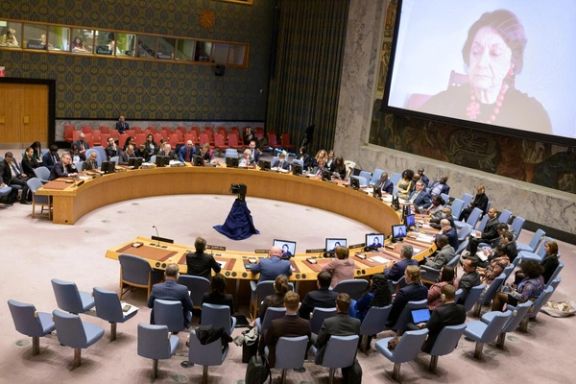
Iran’s alleged supply of drones to Moscow remains high on the agenda at the United Nations and in Israeli President Isaac Herzog’s visit to the United States.
Miguel de Serpa Soares, head of UN legal affairs, told the UN Security Council Wednesday that Secretary-General Antonio Guterres would “continue to prepare” reports on UNSC Resolution 2231.
France, the United Kingdom and the United States last week submitted a letter at the UN arguing any supply of drones by Iran to Russia would violate the resolution, which endorsed the 2015 Iran nuclear agreement. Russia’s UN ambassador Vassily Nebenzia said Wednesday the letter broke the UN Charter by seeking to influence the general secretary.
Antonio Guterres has reported twice a year, in June and December, on the implementation of Resolution 2231, including inspections of military parts found in Saudi Arabia and Yemen. Ukraine, France, the UK and US argue that the resolution contains a provision banning Iran from exporting without prior UN approval certain military goods, including drones.
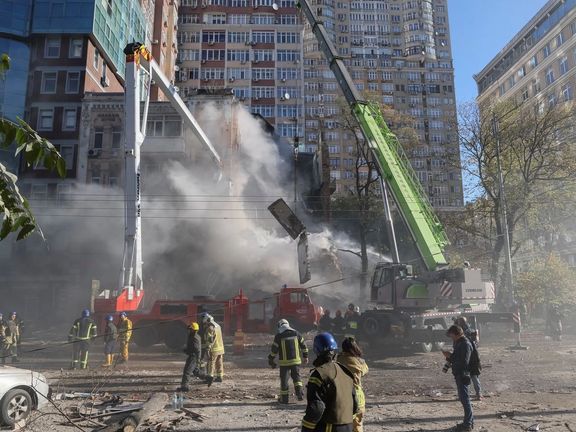
‘National security interests’
The alleged drone supply has also been highlighted this week in the US by Herzog, with Israel’s relations with Russia under the spotlight as Israel’s November 1 elections approach. Herzog pushed back Tuesday against Ukrainian demands from Ukraine for defense assistance, telling an event at the Atlantic Council “there are things we cannot supply due to national security interests.”
But while the Israeli government refuses to give military aid to Ukraine for fear of upsetting its relationship with Russia, the issue has lingered in Israeli politics since Diaspora Minister Nachman Shai tweeted October 16 in favor of sending support as there was “no longer any doubt where Israel should be in this bloody conflict.”
The Jerusalem Post Thursday hit back at Ukrainian President Volodymyr Zelenskyy over his latest broadside, pointing out in an editorial that Iran “developed drones because it can’t build advanced warplanes…[had] exported drones all around the Middle East and targeted Israel for years, and that Ukraine… [had] not backed Israel in the past…” The Post added that rockets used by Hamas and Hezbollah “sometimes…have origins in Russian technology.”
The newspaper argued it took years to deploy and integrate air defense systems and that “it’s not clear even” that Israeli defenses were “appropriate for Kyiv.” Zelenskyy had told Haaretz newspaper that an Iran-Russia “alliance…would not have happened if your politicians had made one decision at a time.” The Ukrainian leader said appeals to Israel went back to 2014, when Russia annexed Crimea.
‘Co-existence and weakening extremists’
Opposition leader Benjamin Netanyahu – who in 2019 adorned his Likud Party HQ with a huge picture of himself and Putin – told USA Today in an interview published October 21 that he hoped the Russian president would rethink “his vision of reconstituting a great Russian kingdom.”
Herzog’s meeting with President Joe Biden saw the US leader call for a ‘two-state solution’ in Israel-Palestine and welcome the maritime agreement due to be signed Thursday between Israel and Lebanon. The Times of Israel reported that US officials had raised concern over escalating violence in the West Bank, which has so far barely surfaced as an issue in the Israeli election.
A White House statement said the two leaders had “discussed the importance of promoting co-existence and weakening extremists who promote hatred and violence.” This year’s growing death toll in the West Bank has reportedly increased support there for Islamic Jihad, which has close links to Tehran.
Biden called the agreement with Lebanon “a historic breakthrough” that took “some real guts…and persistent diplomacy.” Hassan Nasrallah, leader of Tehran-allied Hezbollah, said in early October his party would respect the agreement, which could allow both countries to benefit from offshore gas deposits but which does not cover the land border.
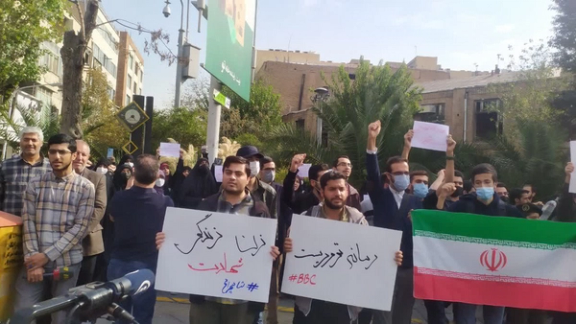
A government-sponsored rally was held outside the British embassy in Tehran Thursday, trying to shift the blame over the current antigovernment protests on the UK’s “hostile policies.”
Fars news agency – affiliated with Iran’s Revolutionary Guard – reported that scores of pro-regime students gathered outside the embassy building “in protest to the British government's hostile actions against the security of the Iranian nation.”
The participants also chanted slogans against the United States and Saudi Arabia as well as the United Kingdom. They also carried banners against the London-based Persian news channels such as BBC Persian. In their banners, they also changed the main motto of the current wave of protests from “Women, Life, Liberty” to “Women, Life, Martyrdom.”
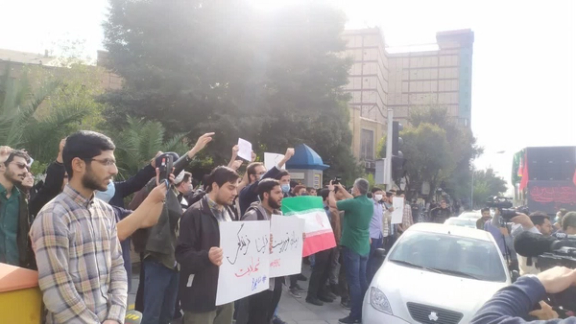
Last week, Iran sanctioned several British individuals and entities over “activities that have led to unrest, violence, and terrorist acts against the Iranian nation.”
These included Tom Tugendhat, Minister of State for Security, Commodore Don Mackinnon, British naval commander in the Persian Gulf, and Steve McCabe, member of parliament ad Chair of Labour Friends of Israel, as well as media outlets and their owners including BBC Persian and Iran International.
On Wednesday, Iran announced a new set of sanctions against institutions and individuals in the European Union, alleging that they incite violence in the country.
A group of Canadian and British lawmakers and politicians have urged their respective governments to take measures to stop Iran’s brutal crackdown on protesters.
On October 22, Iran's hardliner Judiciary said Persian-speaking TV channels based in London, including Iran International, must be designated as “terrorist groups”.
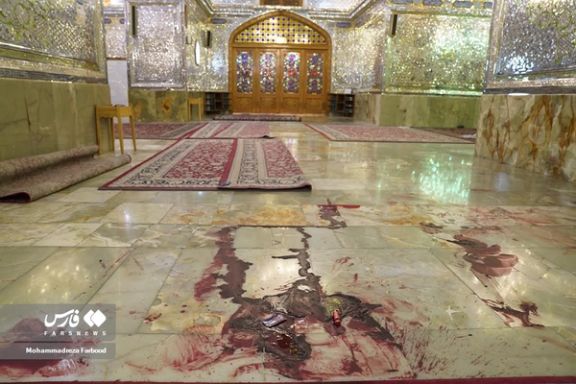
ISIS has taken responsibility for the Wednesday attack on a shrine in Shiraz but many Iranians are not convinced the regime had no part in it, saying it is a scenario for cracking down harder on protesters.
The attack which the authorities call a “terrorist attack by Takfiris” killed at least 15 people and injured dozens more. Iranian state media say two people linked to the incident have been arrested and a manhunt is underway to capture the third.
Hours after the raid, Reuters quoted a statement from ISIS telegram channel saying that the group claimed responsibility for the attack. The group has also released their statement through its affiliated Amaq news agency that said one of its members had “targeted groups of Sunni refusal infidels inside the shrine with his machine gun, causing the death of tens of them.”
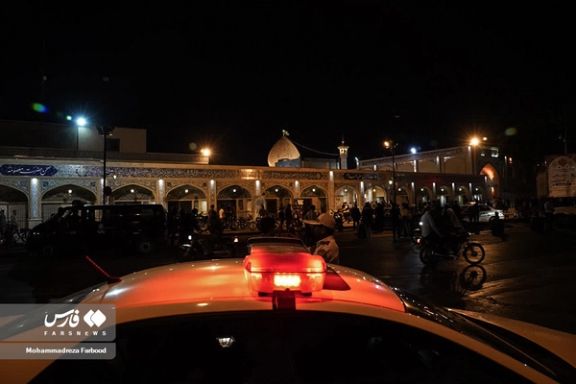
Many Iranian, however, have accused the regime of being behind the attack or orchestrating it to blame protesters at home for causing unrest and insecurity and justify harsher crackdown on protesters.
“Which ISIS force has ever launched an attack without an explosive belt? Why don’t security forces consider the possibility of an explosive belt when arresting the attackers?” a tweet posted by one of the sceptics asked.
“The incident at Shahcheragh is a self-inflicted damage by the Islamic republic to prevent gatherings at the tomb of Cyrus the Great on his birth anniversary on October 29th. Don’t be fooled by their tricks and don’t be distracted from your revolution,” another tweet said.
Others have questioned the easy entrance of the attacker into a shrine despite the usual heavy security measures. “Which stupid terrorist takes such a big weapon with him for an operation without any security cover? Doesn’t the Shahcharagh shrine have [security] at its gate?”
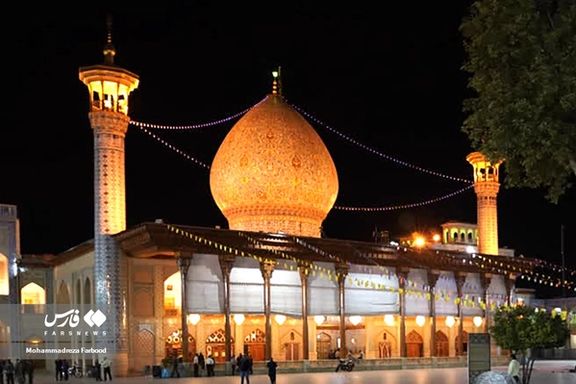
“Let’s suppose the protesters were complicit in the attack on Shahcheragh, but whose fault is it that a significant part of the society does not accept your narrative?” journalist Hadi Mousavi asked in a tweet.
“This time, the child-killing and terrorist regime opened a new chapter in its terrorist acts by desecrating the holy shrine of Shahcheragh and killing defenseless people. Our slogan as of today would be ‘IRGC is ISIS, It is the one who kills pilgrims’, “ an anonymous group called the Youth of Isfahan Neighborhoods tweeted.
Meanwhile, Masoud Kazemi, a political activist, in a tweet accused the Islamic Republic of perpetrating this terrorist act saying that, “The survival of the Islamic Republic is in jeopardy and the regime’s has escalated its fake and abusive actions.”
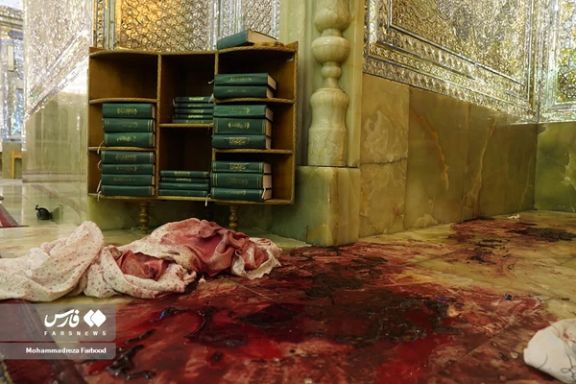
Fariborz Karimi Zand, a former police officer and one of the opponents of the Islamic Republic, in a tweet called the attack “psychological warfare” and sacrificing insiders or civilians to eclipse news of protests. “Nothing should distract us from our main goal which is to overthrow the Islamic Republic.”
Some people have noted a similarity with a 1994 terrorist attack on the shrine of Imam Reza in Mashhad which killed and injured dozens of people. Although a Sunni group claimed responsibility, the Iranian government laid the blame on the People’s Mujahedin Organization of Iran (MEK). However, the former Interior Minister Abdollah Nouri claimed said in his trial in 1999 that it was a false flag attack by the Iranian regime to discredit MEK.
Authorities have been claiming that “separatists” and “instigators” are behind the efforts to overthrow the government and break Iran into areas controlled by ethnic groups
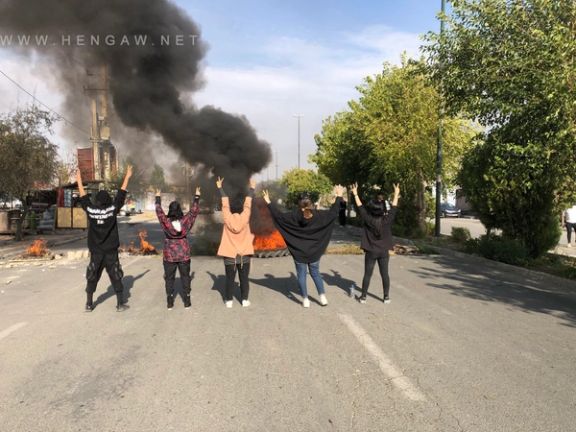
After weeks of intense protests in Iran, some factions within the regime seem to realize that a dialogue is needed with social groups to regain control of the country.
More frequent articles appear in government-controlled media about how to start public discussion and to listen to opponents. But academic Najafgholi Habibi, the former chancellor of Allameh Tabatabai University says the main precondition for a such a dialogue is immunity for individuals who take part in public discussion with hardliners close to the core of the regime.
In an interview with ISNA, Habibi maintained, however, that holding dialogue at the current juncture may not be effective at all.
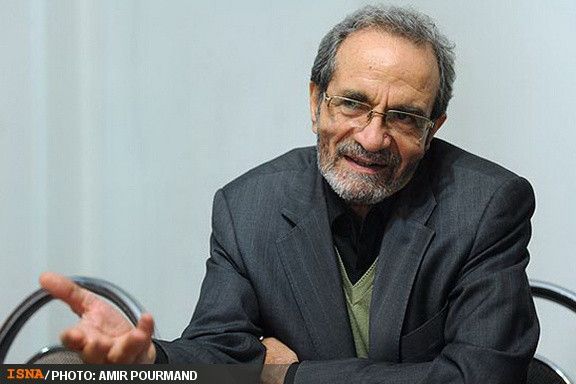
Discussions advocated by some hardliner individuals and organizations including Judiciary Chief Gholamhossein Mohseni Ejei and the Iranian state TV controlled by the office of Supreme Leader Ali Khamenei have their roots in Khamenei’s idea of “free thinking” or “open mindedness” that he put forward in the 2010s which initially aimed at the Iranian universities.
However, even then students who tried to be open minded in meetings with Khamenei found themselves in jail or were harshly criticised by hardliners after they disagreed or came up with new ideas that were not consistent with Khamenei’s rigid mind frame. In other words, he supported open mindedness as long as open-minded people echoed his own words.
Habibi said in the interview that the universities shelved the idea after a short while as they found it impractical under the circumstances. But he did not say that Khamenei’s toleration for different ideas have become even less in recent years after he decided that the entire government should be monophonic with no room for any idea other than his own hardline conservative doctrines.
What Habibi also failed to mention is that the political atmosphere has become so intense that when some traditional reformists recently were given a tribune on state TV, their mild comments infuriated many people on social media who simply reject the Islamic Republic.
In a recent case, social media users harshly criticised Ahmad Zeidabadi for suggesting the idea of communicating with the government on state TV. He said in a tweet after his first ever TV appearance that he “was sleepless that night because of fear of getting arrested.” But this was not his only fear, he said in the tweet that he was afraid of criticism for taking part in a debate at the state TV no matter what he said.
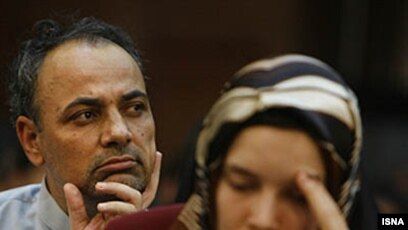
Zeidabadi explained that he was even criticized for talking about non-violent struggle against a regime that attacks peaceful demonstrators with shotguns. Many also criticised him for talking with a regime thug, hardliner Sadeq Koushki, while security forces attacked young children in schools.
Addressing the government, academic Habibi said that the regime should have thought of maintaining dialogue with the people when there was still hope in improving the situation. Now, he said, we can only think of discussions only when confrontation with the people comes to an end.
Nonetheless, he said that the government is planning to launch Dialogue Houses within the universities. This, he said was too late. Universities now are the venues of the most radical demonstrations and harshest slogans with many F-words against Khamenei.
Meanwhile, knowing that the Supreme Council’s idea of a dialogue is nothing more than voicing the Supreme Leader’s ideas, Habibi reiterated that “all academics should be able to voice their ideas, not just one group of them, and all students have a right to have their ideas heard.”
“The society can decide what is right and what is not only after all sides have voiced their ideas,” he said, adding that “This is in the interest of the country.” Habibi stressed that using force against the youths is useless and will not solve any problem.